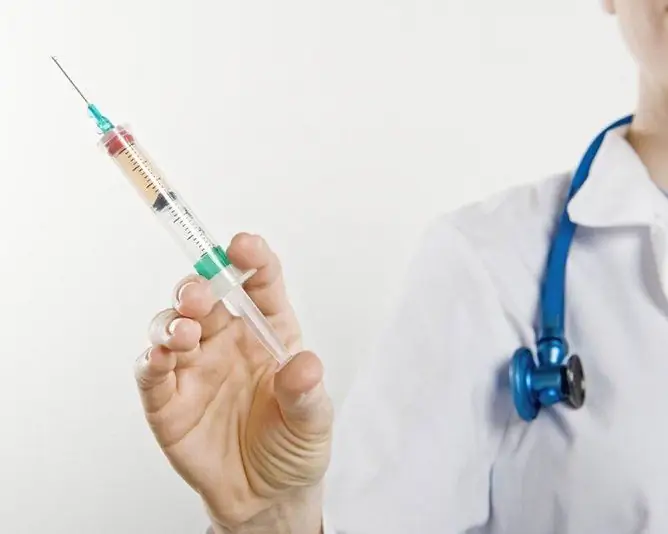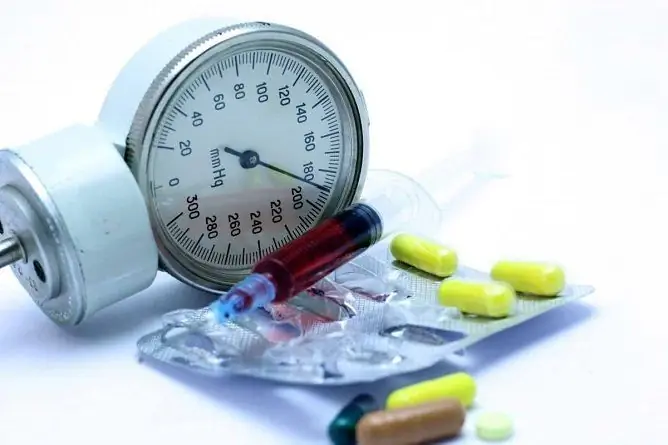Table of contents:
- Tri-Regol
- Release form and composition
- Pharmacodynamics and pharmacokinetics
- Indications for use
- Contraindications
- Instructions for the use of Tri-Regol: method and dosage
- Side effects
- Overdose
- special instructions
- Application during pregnancy and lactation
- Pediatric use
- Use in the elderly
- Application for violations of liver function
- Drug interactions
- Analogs
- Terms and conditions of storage
- Terms of dispensing from pharmacies
- Reviews about Tri-Regol
- Price for Tri-Regol in pharmacies
- Tri-Regol: prices in online pharmacies

Video: Tri-Regol - Instructions For The Use Of Tablets, Reviews, Price, Analogues

2024 Author: Rachel Wainwright | [email protected]. Last modified: 2023-12-15 07:39
Tri-Regol
Tri-Regol: instructions for use and reviews
- 1. Release form and composition
- 2. Pharmacodynamics and pharmacokinetics
- 3. Indications for use
- 4. Contraindications
- 5. Method of application and dosage
- 6. Side effects
- 7. Overdose
- 8. Special instructions
- 9. Application during pregnancy and lactation
- 10. Use in childhood
- 11. Use in the elderly
- 12. Application for violations of liver function
- 13. Drug interactions
- 14. Analogs
- 15. Terms and conditions of storage
- 16. Terms of dispensing from pharmacies
- 17. Reviews
- 18. Price in pharmacies
Latin name: Tri-Regol
ATX code: G03AB03
Active ingredient: Ethinylestradiol (Ethinylestradiol), Levonorgestrel (Levonorgestrel)
Manufacturer: Gedeon Richter (Hungary)
Description and photo update: 2019-05-08
Prices in pharmacies: from 171 rubles.
Buy

Tri-Regol is a three-phase oral estrogen-progestogen contraceptive.
Release form and composition
Dosage form - coated tablets: round, biconvex, glossy, at a break - white (21 pcs. In blisters, in a cardboard box 1 or 3 blisters). One package contains 3 types of tablets.
Active ingredients of pink tablets (6 pcs. In a blister):
- Ethinylestradiol - 30 mcg;
- Levonorgestrel - 50 mcg.
Active ingredients of white tablets (5 pieces in a blister):
- Ethinylestradiol - 40 mcg;
- Levonorgestrel 75 mcg
Active ingredients of dark yellow tablets (10 pcs. In a blister):
- Ethinylestradiol - 30 mcg;
- Levonorgestrel - 125 mcg.
Auxiliary components: magnesium stearate, colloidal silicon dioxide, talc, lactose monohydrate, corn starch.
Shell composition: titanium dioxide (E171), calcium carbonate, copovidone, talc, macrogol 6000, povidone, colloidal silicon dioxide, sodium carmellose, sucrose. In addition, the pink tablets contain iron oxide red (E172), and dark yellow tablets contain yellow iron oxide (E172).
Pharmacodynamics and pharmacokinetics
The drug has the ability to inhibit the pituitary secretion of gonadotropic hormones. With the sequential administration of tablets containing different amounts of ethinylestradiol and levonorgestrel, the concentration of these hormones in the blood is provided, close to their concentration during the normal menstrual cycle, which stimulates the secretory transformation of the endometrium.
The contraceptive effect of Tri-Regol is associated with the following mechanisms:
- levonorgestrel blocks the release of hypothalamic releasing factors (follicle-stimulating and luteinizing hormones) and inhibits the secretion of gonadotropic hormones by the pituitary gland, which leads to inhibition of ovulation;
- ethinyl estradiol provides high viscosity of cervical mucus and makes it difficult for sperm to enter the uterine cavity.
In addition to the contraceptive effect, Tri-Regol normalizes the menstrual cycle (by replenishing the level of endogenous hormones with hormonal components of the tablets). During the seven-day breaks in admission, uterine bleeding takes place.
Levonorgestrel is absorbed quickly enough (less than 4 hours). This substance has no "first pass" effect through the liver. The half-life is from 8 to 30 (on average 16) hours. In the blood, levonorgestrel binds primarily to globulin and albumin.
Ethinylestradiol is absorbed from the gastrointestinal tract quickly and almost completely. The maximum concentration of the substance in the plasma is observed in the range of 1-1.5 hours. The half-life is 26 ± 6.8 hours. Ethinylestradiol is characterized by the "first pass" effect through the liver. The metabolism of this substance is carried out in the liver and intestines.
When taken internally, ethinyl estradiol is released from the blood plasma within 12 hours.
Ethinyl estradiol metabolites are water-soluble derivatives of glucuronide or sulfate conjugation, which enter the intestine with bile and are disintegrated by intestinal bacteria. Levonorgestrel is excreted through the kidneys (60%) and intestines (40%). For ethinyl estradiol, the opposite ratio is characteristic: 40% is excreted through the kidneys, 60% through the intestines.
Indications for use
Tri-Regol is used for contraception (preventing unwanted pregnancy).
Contraindications
Absolute:
- Cholecystitis;
- Cholelithiasis;
- Chronic colitis;
- Pancreatitis, accompanied by severe hyperlipidemia and hypertriglyceridemia (including in history);
- Severe liver diseases and tumors;
- Jaundice due to taking drugs containing steroids;
- Congenital hyperbilirubinemia (Dubin-Johnson, Gilbert, Rotor syndromes);
- Familial forms of hyperlipidemia;
- Vaginal bleeding of unknown etiology;
- Diagnosed or suspected hormone-dependent malignant neoplasms of the genitals and mammary glands;
- Surgical interventions on the lower extremities;
- Phlebitis of deep veins of the lower extremities;
- Chronic hemolytic anemia;
- Sickle cell anemia;
- Otosclerosis with a worsening course that developed during a previous pregnancy;
- Severe forms of diabetes mellitus;
- Herpes, idiopathic jaundice, or severe itching of the skin during a previous pregnancy;
- Arterial hypertension with systolic / diastolic blood pressure of 160/100 mm Hg;
- The presence of severe cardiovascular (including decompensated heart defects) and cerebrovascular changes (or an indication of them in history), thromboembolism or a predisposition to them;
- Migraine;
- Lactase deficiency, glucose-galactose malabsorption, lactose intolerance;
- Bubble drift;
- Extensive injuries;
- Prolonged immobilization;
- Smoking over the age of 35;
- Pregnancy;
- Lactation period;
- Age over 40;
- Hypersensitivity to drug components.
Relative contraindications requiring caution: arterial hypertension with systolic / diastolic blood pressure up to 160/100 mm Hg, compensated diabetes mellitus without vascular complications, multiple sclerosis, varicose veins, epilepsy, porphyria, chorea minor, tetany, bronchial asthma, mastopathy, uterine fibroids, tuberculosis, depression, adolescence (without regular ovulatory cycles).
Instructions for the use of Tri-Regol: method and dosage
Tri-Regol tablets should be taken orally, swallowed whole and washed down with a sufficient amount of liquid, 1 pc daily, at the same time of day, preferably in the evening, within 21 days starting from the 1st day of the menstrual cycle. Next, a 7-day break is taken, during which menstrual-like withdrawal bleeding occurs. On the 8th day, a new package is started.
The duration of the drug is determined by the need for contraception.
In case of switching to Tri-Regol from another oral contraceptive drug, a similar regimen should be followed.
After an abortion, it is recommended to start taking the drug on the same or the next day after the operation.
If the next pill is missed, if no more than 12 hours have passed, the contraceptive should be taken as soon as possible. If 36 hours have passed, the effectiveness of the drug decreases. To avoid intermenstrual bleeding, you need to continue taking the drug from the current package minus the missed tablet (s). During this period, it is recommended to use an additional non-hormonal method of contraception, for example, a barrier method.
Side effects
- Reproductive system: intermenstrual bleeding, decreased libido, engorgement of the mammary glands; rarely - vaginal candidiasis, increased vaginal discharge;
- Digestive system: nausea, vomiting; rarely - diarrhea, jaundice, liver adenoma, hepatitis, gallbladder disease (including cholecystitis and cholelithiasis);
- Metabolism: an increase in body weight; rarely - a decrease in glucose tolerance, an increase in glucose and triglycerides in the blood;
- Sense organs: in some cases - visual impairment, conjunctivitis, discomfort when wearing contact lenses, eyelid edema (these phenomena are transient and disappear after the cancellation of Tri-Regol without the appointment of appropriate treatment); very rarely with long-term use - hearing loss;
- Skin: chloasma; rarely - hair loss, skin rash; with long-term use, very rarely - generalized itching;
- Others: rarely - thrombosis and venous thromboembolism, increased blood pressure, increased fatigue; very rarely with prolonged use - coarsening of the voice, cramps of the calf muscles.
Overdose
Overdose symptoms are uterine bleeding and nausea. At the first signs of an overdose in the first 2-3 hours, gastric lavage and symptomatic therapy are recommended. There is no specific antidote for the drug.
special instructions
Before starting to take a contraceptive, pregnancy should be excluded, a general medical and gynecological examination should be performed, including a cytological analysis of a smear and an examination of the mammary glands. Further examination by a gynecologist must be carried out every six months during the entire period of use of the drug.
Tri-Regol can be taken after childbirth, but only if the woman is not breastfeeding.
You should start taking it no earlier than the first day of the menstrual cycle.
Pain in the upper abdomen, hepatomegaly and intra-abdominal hemorrhage may indicate the presence of a tumor in the liver, therefore, if symptoms appear, stop taking the drug and consult a doctor.
Patients who have had viral hepatitis can take a contraceptive no earlier than 6 months later and only if the liver functions are normalized.
When diagnosing liver dysfunction, the doctor must decide whether it is advisable to continue using this contraceptive.
It should be borne in mind that oral contraceptives can affect the results of some laboratory parameters, in particular, on the indicators of fibrinolytic factors and blood coagulation, levels of lipoproteins and transport proteins, functional indicators of the adrenal glands, kidneys, liver and thyroid gland.
In the event of the appearance of acyclic spotting, it is possible to continue taking Tri-Regol only after excluding organic pathology.
In case of diarrhea or vomiting, you should continue taking the drug, but additionally use a non-hormonal method of contraception.
According to the instructions, Tri-Regol must be canceled immediately in the following cases:
- The onset of pregnancy;
- New or worsening migraine-like or unusually severe headache, sharp deterioration in visual acuity, suspicion of a heart attack or thrombosis;
- A sharp increase in blood pressure, the occurrence of generalized itching, the appearance of jaundice or hepatitis without jaundice, increased frequency of epileptic seizures;
- Prolonged immobilization (for example, due to trauma).
In the event that a planned operation is planned, the contraceptive should be stopped 6 weeks before the appointed date.
For women planning pregnancy, Tri-Regol must be canceled at least 3 months in advance.
The drug has no negative effect on the speed of reactions and the ability to concentrate.
Application during pregnancy and lactation
It is forbidden to use the drug during this period.
Pediatric use
In adolescence (in the absence of regular ovulatory cycles), Tri-Regol is used with caution.
Use in the elderly
It is forbidden to use the drug for persons over 40 years old.
Application for violations of liver function
The contraceptive is contraindicated for tumors and severe liver diseases.
Drug interactions
The following drugs can reduce the contraceptive effectiveness of Tri-Regol: tranquilizers, tetracyclines, sulfonamides, neomycin, rifampicin, ampicillin, polymyxin B, phenylbutazone, chloramphenicol, dihydroergotamine. For this reason, it is necessary to use these combinations with caution, and while taking these drugs, additionally use a non-hormonal method of contraception.
In the case of the simultaneous use of bromocriptine, its effectiveness decreases.
When combined with tricyclic antidepressants, beta-blockers or maprotiline, an increase in bioavailability and, as a result, an increase in toxicity is possible.
With the simultaneous use of coumarin derivatives, anticoagulants or indandione, it is recommended to more often determine the prothrombin index, it may be necessary to change the dose of the anticoagulant.
When using an oral contraceptive in combination with drugs with a potential hepatotoxic effect (especially with dantrolene), the risk of increased toxicity increases, especially in women over 35 years old.
During the period of use of the drug, correction of insulin or oral hypoglycemic agents may be required.
Analogs
Analogs of Tri-regola are: Trigestrel, Triziston.
Terms and conditions of storage
Store at 15-30 ° C. Keep out of the reach of children.
The shelf life is 5 years.
Terms of dispensing from pharmacies
Dispensed by prescription.
Reviews about Tri-Regol
Reviews of Tri-Regol patients are quite controversial, however, most users respond positively to the drug. Often, after canceling the course, there are no problems with pregnancy.
The doctors' comments on the contraceptive are mostly positive: the relative harmlessness of the drug and its low cost are noted. The drug is often prescribed to patients who need to normalize the menstrual cycle.
Price for Tri-Regol in pharmacies
The price of Tri-Regol is approximately 267–330 rubles for a pack of 21 tablets and 700–960 rubles for a pack of 63 tablets.
Tri-Regol: prices in online pharmacies
|
Drug name Price Pharmacy |
|
Tri-regol film-coated tablets 21 pcs. 171 r Buy |
|
Tri-regol tablets 21 pcs. 277 r Buy |
|
Tri-regol set of tablets coated tablets 63 pcs. 497 r Buy |
|
Tri-regol tablets 63 pcs. 786 r Buy |

Maria Kulkes Medical journalist About the author
Education: First Moscow State Medical University named after I. M. Sechenov, specialty "General Medicine".
Information about the drug is generalized, provided for informational purposes only and does not replace the official instructions. Self-medication is hazardous to health!
Recommended:
Nicotine Patch - Price, Reviews, Indications

Nicotine patch is an effective remedy for weaning from nicotine addiction
Tantum Verde - Instruction, Application For Children, Price, Spray, Tablets

Instructions for use Tantum Verde in the form of a spray, tablets and solution. Information on doses for children, contraindications, reviews, analogues and the price of the drug in pharmacies
Erispirus - Instruction, Use For Children, Price, Tablets, Syrup

Instructions for use Erispirus tablets and syrup. Information on the dosage for children, contraindications, reviews, analogues and the price of the drug in pharmacies
Tablets For Sinusitis In Adults And Children: A List Of Antibiotics, Reviews

Sinusitis requires an integrated approach to treatment. The leading role in therapy belongs to antibiotics, which prevent the development of serious complications
Antibiotics For Angina In An Adult In Tablets: List, Reviews

Treatment of angina with antibiotics in adults occupies a leading place in the bacterial form of the disease. The drugs are prescribed in the form of tablets, powder, solution for injection






